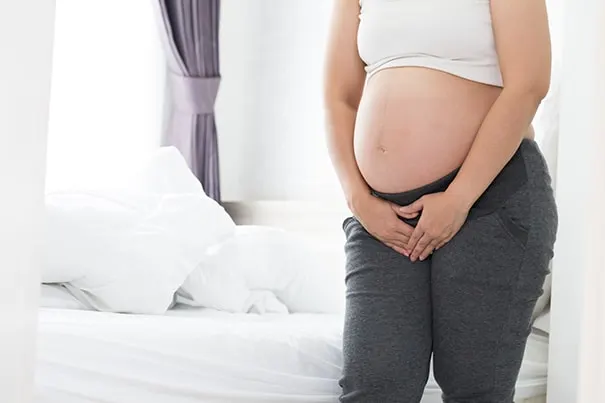Pregnancy Symptoms: Frequent Urination
You may be wondering whether peeing a lot is a sign of pregnancy or whether this urge to pee so often will ever go away. Frequent urination is a common early pregnancy symptom, but it can also reappear later on during pregnancy as your uterus and baby grow, and your baby’s head puts pressure on your bladder. Although it can definitely be annoying, in most cases, it’s nothing to worry about. Read on to find out what causes frequent urination during pregnancy, get some tips to help you manage it, and learn the signs that indicate it may be linked to another condition, like a urinary tract infection.
What Causes Frequent Urination During Pregnancy?
You may notice the urge to pee more often than normal early in your pregnancy, it’s also a common sign of pregnancy. Although peeing often during pregnancy is annoying, especially when it means you need to get up for the loo at night, it’s also a normal and common pregnancy symptom. Here are some frequently asked questions about this symptom:
What is considered frequent urination in pregnancy? There’s no set number of visits to the loo – it’s simply needing to go more often than you usually would.
When does frequent urination start during pregnancy? How soon it may start differs for each woman. Frequent urination is often an early sign of pregnancy, so you may feel the need to visit the loo more often early in your first trimester.
Will I need to pee this often the whole pregnancy? It may ease up for a while after you enter the second trimester, but you may find the increased urge to pee returns later on, as your growing baby places more pressure on your bladder. Toward the end of the third trimester.
How often should you pee? Whenever you have to! It’s better not to hold it in.
Tips to Manage Peeing Often While Pregnant
You can’t really avoid more frequent urination, and you really wouldn’t want to, as it’s a natural consequence of drinking lots of fluids to stay well hydrated and healthy during pregnancy. Here are some tips that might help make your life easier:
Lean forward and back when you pee so that you can empty your bladder properly
To prevent increased urination at night, try not to drink too much water just before going to bed
Avoid beverages and foods containing caffeine, which can make you need to pee more often
If your urine is dark yellow or orange, this may be a sign of dehydration − try to increase your fluid intake until your urine is back to a normal pale yellow
If you’re heading out the door, or you know you’re going into a long meeting, consider one more dash to the toilet beforehand. You can also try to scout out where the nearest loo is so you’re not caught off guard.
Can Pregnancy Peeing Be a Sign of a Problem?
More frequent urination is usually a normal pregnancy symptom. However, sometimes it can be a sign of a medical condition that may require treatment by your GP. These conditions include:
Urinary tract infection (UTI). Many women wonder whether frequent urination is part of pregnancy or a UTI. If it’s a UTI, you may notice a painful, burning sensation while peeing, have a fever, notice cloudy urine, or see blood in the toilet. If you suspect you have a UTI, consult your GP, as this infection requires treatment – often antibiotics.
Gestational diabetes. Frequent urination can sometimes be a sign of gestational diabetes, generally a temporary form of diabetes that affects a small percentage of mums-to-be. Pregnant women may be tested for gestational diabetes between 24 and 28 weeks of pregnancy. If gestational diabetes is detected and managed, then the pregnancy outcomes are minimally affected, and the diabetes will usually go away after you give birth. If you notice symptoms like frequent urination combined with persistent thirst, dry mouth, or fatigue, consult your midwife or GP.
Frequent urination during early pregnancy is common and usually nothing to worry about. Although it may feel as if you are peeing all the time, keep in mind that it may ease up for a time, before returning later on. Once your baby is born, your urge to pee more often should slowly go away, and you’ll only have your newborn’s pee to take care of!
Join Pampers Club and get:




